
Interview with SA Scharführer/Blockleiter Alfred Stroebel, Germany, 1987.
[Above: 'Und Ihr habt doch gesiegt' (And Despite All You Were Victorious).]
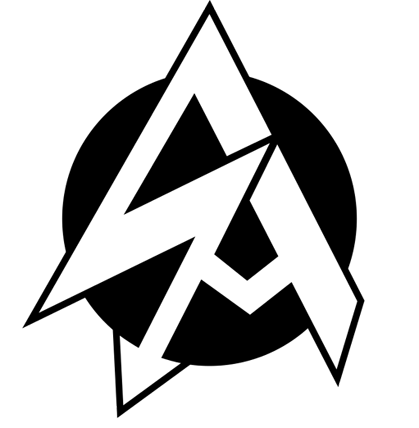
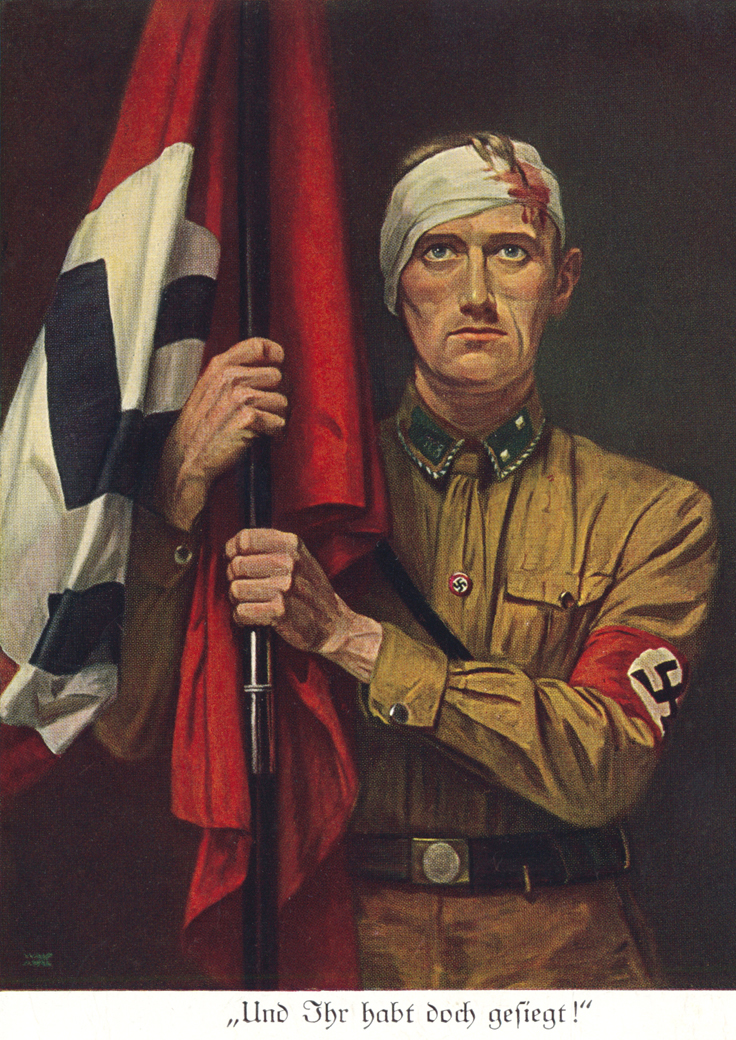

Interview with SA Scharführer/Blockleiter Alfred Stroebel, Germany, 1987.
[Above: 'Und Ihr habt doch gesiegt' (And Despite All You Were Victorious).]


I wanted to ask you some questions about the early life of the NSDAP and what it was like.
Alfred: I am happy to help you junge, ask away. I have not been asked about the good days for a very long time.
Can you tell me how you started your early life in the SA?
Alfred: In 1917 I was called up to serve the Kaiser being a mere 17 years old. The unit I was assigned to was promptly sent to the Western Front in late 1917. I went through the final Michael offensives [Operation Michael was a major German military offensive during WWI that began the German Spring Offensive on March 21, 1918.-Ed.] and had to endure the final defeat and retreats back to the fatherland. In 1919, the Germany I saw was not the same Germany I had left. I was from Berlin and when I returned it was a city in chaos. We had communists trying to wrest control from the weak government, newly created Poland was invading our eastern borders, and France was taking control of our western borders.
I was a very patriotic person, as I was always raised that my nation and my people are the most important things in life. I was appalled and angered at the state of Berlin. I saw the open fights between Spartacus [The Spartacus League was a communist organization in Germany whose goal was to 'institute a Soviet republic that would include all of Germany.-Ed.] and the Freikorps. I was quickly adopted in a Berlin Freikorps unit and sent to fight the Poles who had seized land in Silesia. Our Freikorps defeated these attacks and by 1921, a semblance of order had been restored. Berlin always seethed with communist sympathies, which always seemed to show itself.
I was attending school for business but I started to become very bothered by the political situation in Germany. The communists were always busy trying to take over the country to mirror it to be like Russia, just as their masters in Moscow wanted. I was approached on the street many times to join them but was repulsed by their message, which was foreign to me. It seemed like they wanted to destroy the very foundations Germany was built on -- God, service to your people, and respect for the ancestors. I wanted nothing to do with committing national suicide. I had classmates who were fellow nationalists and former soldiers who told me about the NSDAP and its leader Adolf Hitler. At first I thought this was just another socialist Marxist cause, until I heard a speaker talk about rebuilding Germany and giving our people real hope.
I made my mind up to join the Berlin SA, and it was the best decision I have ever made, besides the choice of my wife.
So what was it like being an early NSDAP member?
Alfred: It was a hard life. Germany was just starting to feel the burden of the peace treaty. The reds were trying to push their agenda on everyone and the majority of the people were just trying to survive in a Jewish dominated land. What I mean by that is toward the end of WWI the Kaiser had become very friendly with some Jews whom were plotting to overthrow the Czar. Through this he saw an alliance that could bring victory to Germany. What ended up happening was the reds gained power in Russia, then moved on to Poland and the Reich. Many Jews from the east flooded into our cities to aid this or to seek better jobs, and because a few Jews had been put into high positions right after the war, it was friends helping friends get very good jobs.
They then used their money and power to promote all lewd behavior and it was as if anything goes. Our people seemed to lose their minds during this time, women became whores, children drug runners, some men homosexual perverts, and everyone else a pawn on the sidelines in the sick game.
Everywhere you looked in Berlin Jews were at the forefront of money, drugs, lewd behavior, and race-mixing by bringing in people from all over the world for porn and mingling with German women. Marxism was their main theme. Marx and all the main creators of this movement were Jews. Most everyone knew it, but few cared or resisted. We saw it as our first and foremost task to stand against all the things we saw as bad, to give our people good examples to follow. My section leader was very big on wanting us to get out and help our people in every way we could. We also wanted to march and show our enemies did not intimidate us.
I was surprised at how many men came into our ranks, even with all the attacks the papers hurled at us. Our first march was in 1923 and it was a disaster. There were 100 of us, and we were met with thousands of Marxists, Jews, anarchists, and other anti-nationalists who wanted to silence us. Hitler was starting to drive the NSDAP into the minds of every German by getting out the message of saving Germany and returning us to better times. Our enemies were cruel and violent, this first march resulted in me getting a hard knock on the head by a bottle, and sometimes up to 15 men attacked one of us at once. I wondered to myself how we would ever win against such odds.
We kept putting up flyers urging our people to action, going to rallies, and helping in our communities. In November 1923 the Putsch was staged and failed in Munich. I had started to question if this was all worth it, men had been killed, Hitler arrested, and the NSDAP banned. The reds and their allies were overjoyed, throwing parties and having celebrations in the streets. Our Bannführer met with us all and even told us he was not sure what would happen, but we should stay in touch. Others tried to take the reins from the Führer and build the party according to their wishes, but these fell flat.
I went back to school to work on my degree in '24 and '25. I could not help the way I felt, but I still saw my nation and its people crying out for help. In early 1925 we learned that Hitler was freed and the party was being reborn. I quickly flocked to join the SA again, which now had new leadership. Ernst Röhm came to Berlin to speak to us and to demand from us a strong will and sacrifice to fight our enemy and awaken our people. Our ranks swelled to several hundred; again, former soldiers who were not afraid to fight came to us. I was made an SA Scharführer, or sergeant, my spirits were very high.
We were presented with our own flag and set to start marching again to take back red areas of Berlin. We wanted to show the workers we were strong and we had a better message. We put up flyers regarding our intentions and the following day we marched. The reds were out in force as usual, however this time we knew what to expect from them. We always had orders to let them be the first aggressor, as the Berlin police chief was a Jew and always sided with the reds against us, locking us up and letting them off. But we never shied away from a fight, we were men, and defenders of our ideals.
Sometimes our marches turned into fights, as we were often attacked, but we always fought back. Once a red was bleeding very badly and a comrade stopped to help him, and was attacked by the police and arrested. Our Bahnnführer was furious and the party attorney said no more help for wounded reds, but they were still our racial countrymen so I vowed to help any wounded person, even if they were trying to destroy us.
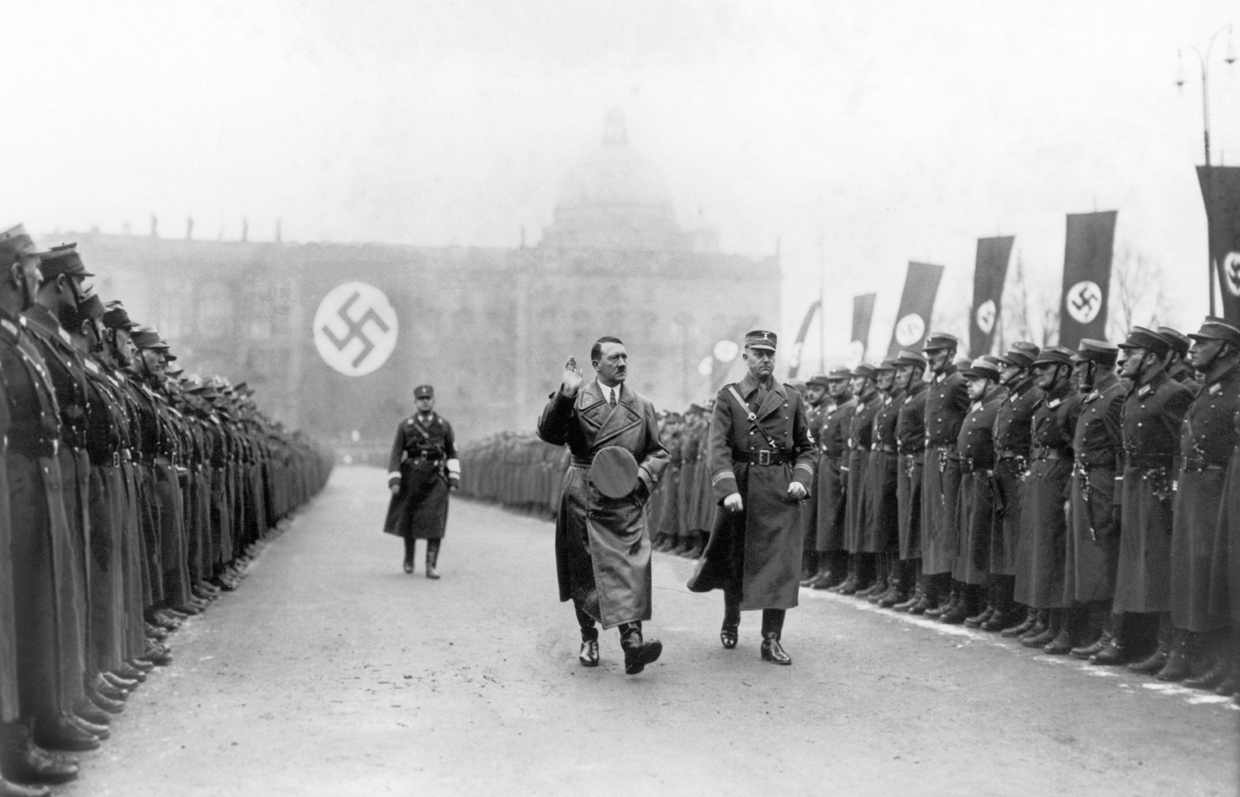
[Above: Adolf Hitler and SA leader Viktor Lutze review the SA, 1937.]
How did you view the people who attacked you?
Alfred: I think we mostly had pity for them; these were mostly our compatriots who we viewed as having misplaced convictions, largely because of a foreign people having influence over them. We never had hate in our hearts. I remember Dr. Goebbels giving a speech to us and he said that even though we may want to harm our enemies, fight them with their same tactics, and go after their families, like they did to us, we must use restraint as they are our people. We do not want to give any ammunition to the Jew press who already showed us in a very bad light.
We would fight them when attacked, and I am sure some of our ranks did not heed the requests for restraint, but overall we showed our enemies great compassion but they did not reciprocate. Just look at what they did at the funeral for Horst Wessel. They attacked his parents, his procession, and the pastor giving the eulogy. The reds and their helpers had no respect or decency.
Did you know Horst Wessel?
Alfred: Not personally, I only knew of him, but I did see him in action while we marched with his sturm sometimes. Berlin was a very large city and each SA unit was in a different district, mine was far away from Horst's so we maybe would see each other every few months for a march, but we never did work together where I would call him a friend. He did have an excellent reputation as a good leader and fearless attitude which is why the reds killed him.
What was the mood like after the martyrdom of Horst Wessel?
Alfred: It is sad to say, but his death was the best thing for the Berlin SA. Our movement had been steadily growing from 1925 and by 1930 we had men in the Reichstag, and other offices. People were being pulled off the fence, the reds also were growing as well, but the nation was being put into two distinct sides. The average German who read about his murder was appalled that the reds were resorting to killing anyone who disagreed with them. Even with the media on their side the truth could not be hidden. Our voting campaign had brought huge shifts, Berlin was no longer being called the cradle of red resistance, and we were breaking their grip. The death of Horst energized us to superhuman feats to wake up our people.
Because of the cruelty of the Red Front [paramilitary terrorist group of the Communist Party of Germany (KPD)-Ed.], defense of anti-Christian causes, support of anarchy and lawlessness, and lack of discipline, more of the working class jumped over to our side. Since 1929 the economic situation got much worse for the average German. Suicides skyrocketed, sickness and drug abuse were claiming many thousands. We were the constant; we brought a message of godliness, wholesomeness, love of people and nation and discipline. By 1932 Berlin and all of Germany had changed. We were so strong now that we could march down our streets and the Red Front dared not attack us, as they knew they were outnumbered now.
We could march past the Liebknecht Haus [the headquarters of the Central Committee of the KPD (Kommunistische Partei Deutschlands, or German Communist Party), named in honor of Karl Liebknecht, a dead KPD leader.-Ed.] and now all we had to deal with was the howls and cries of a dirty, beaten foe. The police were even disjointed, most not following old Issy the Jew's orders. I was able to attend many more rallies and marches as my school was finished and I was now going all over the Reich. Everywhere I went I saw the support we had earned. Then came January 1933, the Führer was elected chancellor by a pretty wide margin, the dark days of red terror were over. The murder of Horst, and Herbert [Herbert Norkus, a 15 year old Hitler Youth member who was stabbed to death by a group of communists on January 24, 1932.-Ed.], just to name a few, really turned the tide for us.
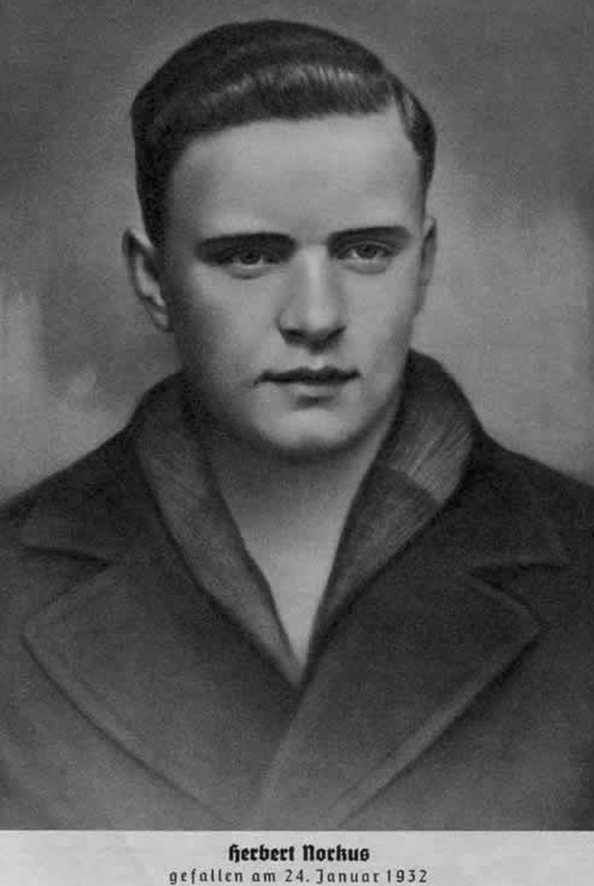
The Red Front made claims that the SA was a terror group who was killing and hurting anyone who opposed National Socialism. What is your response?
Alfred: Well, it is 1987, they won the war, they get to write the history of the Third Reich and they are liars regarding that history. As I mentioned, our leaders urged us to use restraint, even when it was very hard to follow that command. We were fighters and we wanted to exact vengeance against these people who claimed to be fighting for the workers and human rights, but were willing to kill to achieve those aims. A good example of how we won over our people is this: a few comrades and I were coming home from a night on the town; we came across a man beating a screaming woman. When we approached to see what was happening, he snarled that she was a whore and owed him money. We could see what was happening, the man was a Jew, and her pimp. The girl was in her 20s and very pretty, a comrade pulled her up and started talking to her. She said she was being forced to be his whore and wanted out.
He was a perfect looking Jew, big hooked nose, fat, black hair, big ears and high forehead. Because he had beaten this poor woman, we beat him. We made sure he could not hurt anyone for a long time. She had nowhere to go so a comrade arranged to take her to a safe place to get her the help she needed. She was very grateful and became a party member and my comrade's girlfriend later, which I am sure that was his ulterior motive in the first place.
The attacks by the Red Front are forgotten today, but they got away with murder. Comrades had petrol thrown on them, and set afire, human waste thrown on them, and the usual bottles and bricks. They threatened family members of SA men, a child of one of our comrades was attacked on their way home from school. During a march a comrade was stabbed by someone who was jeering at us. The media ignored all of this, but let us punch a red and it was front news.
We fought them differently for the most part, our leaders wanted us to be strong and not bullied, but also to use our minds against them. We disrupted a meeting once by dumping bees nests that a comrade caught and put in tight bags. Once the meeting was going, we threw the bags in through windows and watched the fun.
Were there any regrets fighting for Hitler?
Alfred: I would say the war. The German people only got to see six years of peace under National Socialism. We lived through six years of sheer terror, from bombings, invasion, to final defeat. We had to endure a vicious re-education program that imprisoned people for their service to their nation. From 1933 to 1939 Germany was transformed into a totally new country. We were so advanced over our other European brethren that there were long queues to come work in the Reich. It is just very sad to me that the German people were forced into a war that left very bad scars. A war which we have been told to blame on Hitler and National Socialism. The truth is the opposite. Germany was forced into a planned war due to the jealousy and hatred of the British and French. They used an ignorant Poland to get it started and fought a very cruel and vicious war. A great testimony to Germany and National Socialism is that it took the combined might of four superpowers to defeat us, and only by the cruelest means.
What was your life like after the assumption of power?
Alfred: It was good. I went on to run a business in the city, was a party leader (Blockleiter) with good connections. I was a fervent National Socialist and still stayed true to the tenants of our beliefs. I met my wife in 1928 and was married in '33. We had a very good life, free of debt, free of fear, and love of God and culture. We always had parties to attend, which is good for morale. Lots of quality beer and wine from the best German businesses. It was as close to a utopia as one could get I suppose.
You would have had to experience it to understand. It was a life with freedom, pure freedom like a nation has never experienced before. Of course during the war freedom was curtailed, you did need a license or a pass for everything that came during the war. Not much has changed.
The problems every major society has were easily dealt with due to National Socialist thought. It was always "what is best for the people, not just the individual". Suicides pretty much stopped, drugs vanished, and crime didn't exist, except for very small incidences that were harshly, but fairly, dealt with. Germany was becoming a world leader in fashion, food, technology, and many other areas. My wife was a clothing designer and modeled some of the first bikinis, which were to grace the female form, not belittle it. She worked with the National Socialist Women's League [Nationalsozialistische Frauenschaft, or NS-Frauenschaft] to build up the confidence and morals of young women, where Weimar tore them down. Then came the war, which took it all away.
Due to the war, I was called to the flag in 1944 and sent to a Luftwaffe flak unit, manning heavy flak guns outside Berlin. I won the Iron cross and the Flakkampfabzeichen for helping down 12 four-motors [heavy bombers]. In the end I was captured by Americans, sent to a concentration camp for one year and ordered to go through "reeducation." By 1947 was allowed to come back into mainstream society. Luckily my wife fled west to live with her sister in the mountains and we survived. We rebuilt our lives and made the best out of the situation as best we could. National Socialism always taught us to be self-sufficient and use our community for help. The German people did not let us down.
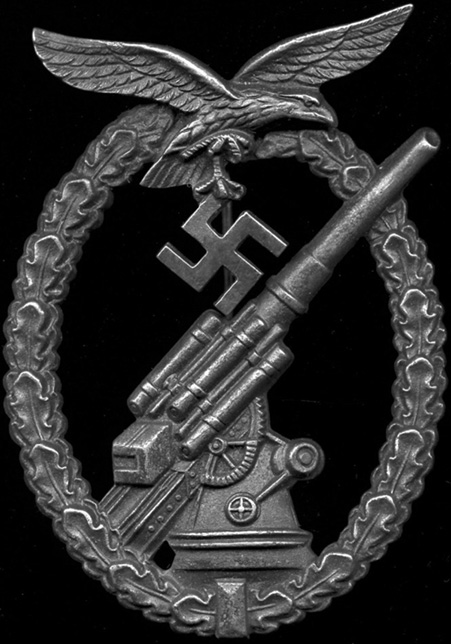
[Above: The 'Flakkampfabzeichen der Luftwaffe' (Luftwaffe anti-Aircraft Combat Badge).]